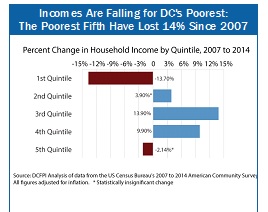The poorest fifth of DC households had an average income of only $9,300 in 2014, a loss of $1,500 since 2007 and lower than in most major U.S. cities. Meanwhile, DC’s upper-middle income families have seen their earnings steadily grow, and the average household income of the top 5 percent of District residents has remained one of the highest of all large U.S. cities.
A new report released today by the DC Fiscal Policy Institute details this staggering inequity and deepening poverty in the District since the Great Recession. Research shows that DC’s lowest-income residents are overwhelmingly African-American, and nearly half were born in DC. This suggests that while the District’s population and economy continue to grow, long-term communities of color are being left behind.
Other major findings from the report include:
DC’s poor families are among the poorest in major U.S. cities. The average income of the poorest fifth of DC households ranked 31st among the 50 largest U.S. cities.
DC’s poor families have far lower incomes than suburban families. The average income of the poorest fifth of DC households is as much as two-thirds lower than it is for low-income families in some surrounding jurisdictions.
Income inequality in DC has remained one of the highest among large U.S. cities for nearly a decade. The average household income of the top 5 percent of DC residents was 52 times the income of the bottom 20 percent in 2014. That is the fifth highest gap among the 50 largest U.S. cities. This income gap has remained statistically unchanged since 2007.
These findings illustrate the urgency of taking steps to help offset economic trends that make life more precarious for many DC households. The District should help protect families with children by making its TANF time limits more flexible, so already-poor children are not thrust even deeper into poverty. To create paths to better jobs for DC residents, the city should address challenges in its system for job training, adopt legislation to require employers to give service-sector workers more predictable schedules and full time hours, and establish paid family leave insurance. These are all steps that can help to enhance economic mobility and promote stable living environments for the district’s most vulnerable residents.
Finally, more investment is needed in affordable housing to keep up with rising needs. Steps should include preserving and repairing the District’s existing low-income housing, as well as establishing rules that enable all families to return to redeveloped properties.
To print a copy of today’s blog, click here.
